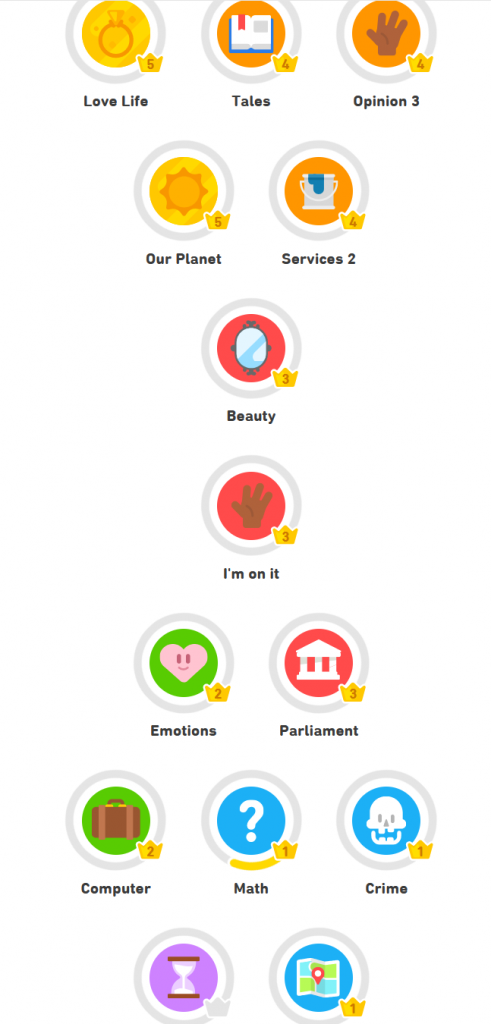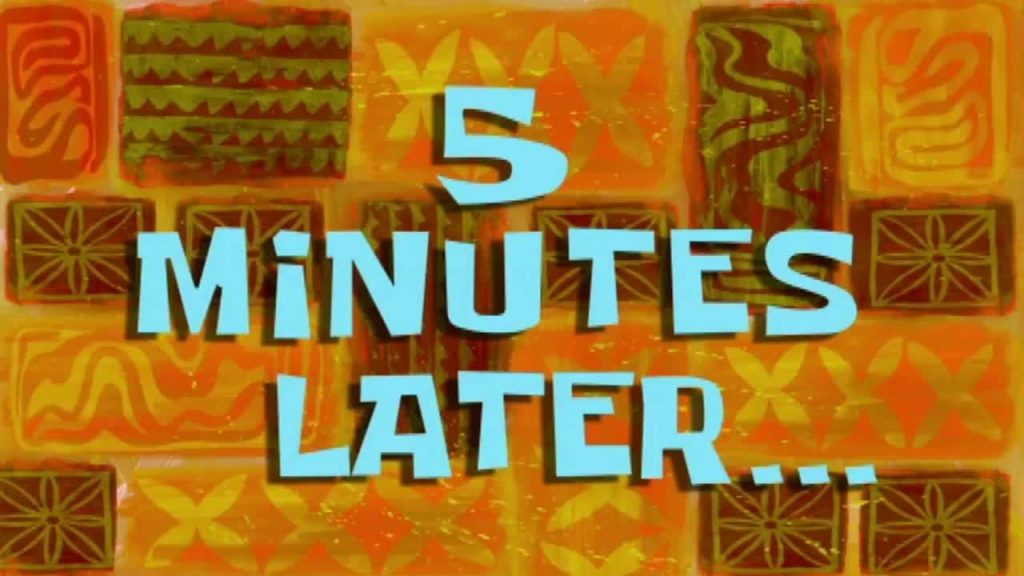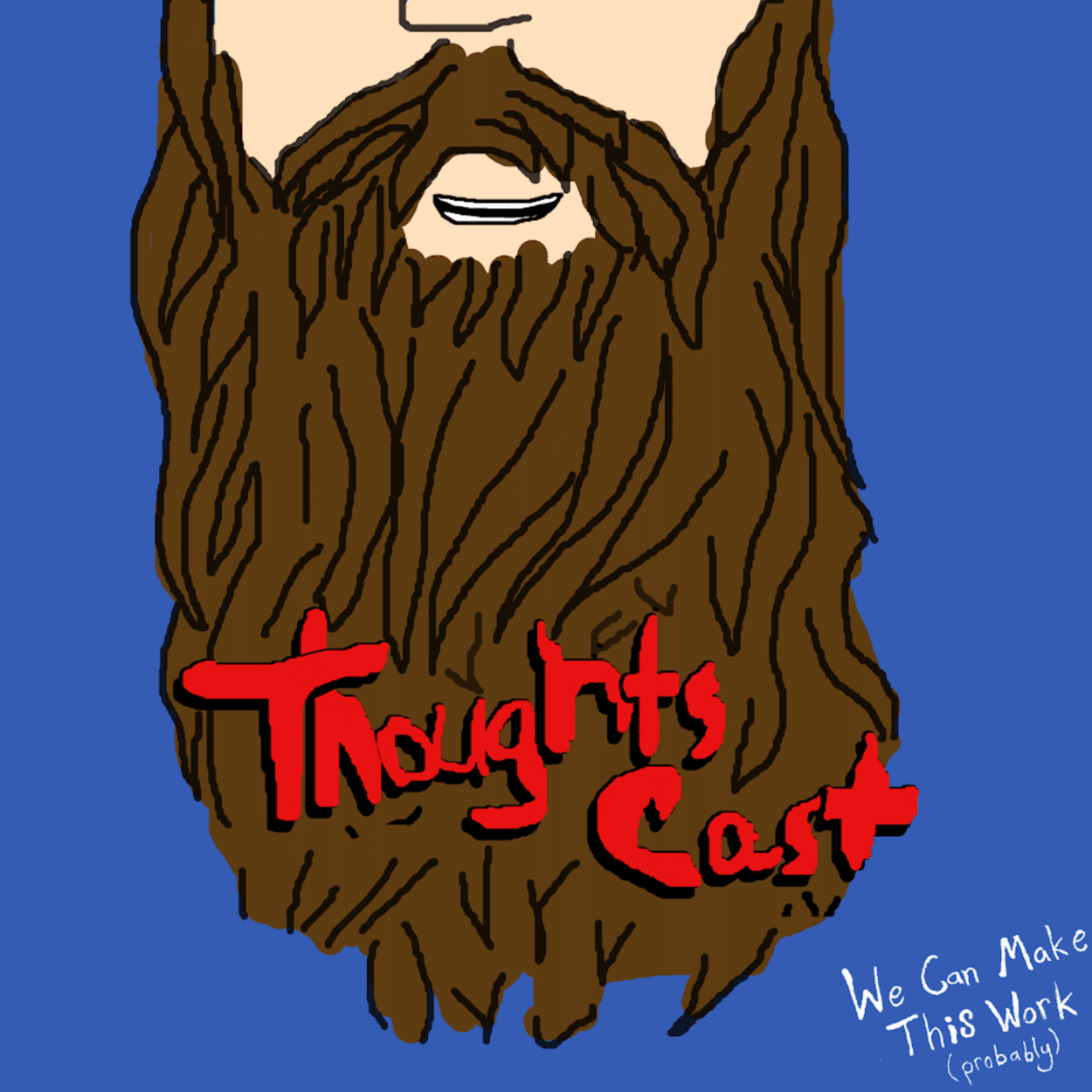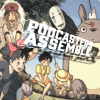Big Bong knows what’s up
In the character of the B2 (upper-intermediate) speaker, he says
“When you learn a language, you always reach that intermediate plateau. It’s very frustrating, and sometimes we just feel like giving up. I stagnated like this for several months, and it’s really during my university exchange in Lyon that I could overcome it. And now, it’s incredible! I learn new things every day!”
Fear of the Giant Fascism Countdown Timer™ ensures I will never give up, but the frustration is real. On the intermediate plateau, I’ve learned enough French to not feel like a newcomer to the language, but it seems like there’s always tons of new material to learn, and I’m regularly embarrassed by what I don’t know. I’m writing this blog post to (a) better organize my thoughts and maybe lessen the frustration as I continue learning French, and (b) maybe give some tips to folks in our audience as they make their language learning strategies work (Probably). While the focus is on French, I’m sure there are parallels with the language you’re learning. I’ll briefly cover my past visits to the intermediate plateau in other languages. I’ll then talk about the makeshift learning routine I put together starting in 2020 and gradually added to until I completed the Duolingo French tree. Next, I’ll talk about how that learning routine changed, both as I progressed in the language and as outside circumstances changed. Finally, focusing on language goals that are as concrete as possible, I’ll outline a new self-study program that reflects how things need to change as I go To Fluency And Beyond!
I’ve been here before…twice
Between my junior and senior years at UMaine-Orono, I went from zero to pretty well conversational in German by spending seven weeks in the German program at Middlebury Language Schools. Middlebury College in Vermont offers these intense language immersion programs where you have to spend all your time using the language of instruction. You can learn as much as a year’s worth of the language in a single summer. I did this because my big career goal at the time was to get my PhD in political philosophy and study 19th century German philosophers like Kant, Hegel, and Nietzsche. Unrealistic, sure, but remember, this was the summer of 2008. It was the earliest months of the Great Recession and not everyone knew how messed up the academic job market was. I learned the importance of having a dictionary within reach whenever possible, the value of mass media in the target language on top of what’s in the textbook, and the kind of spontaneous learning that comes from having to speak the language around practically everyone you meet, preserved in inside jokes like “Heute ist Montag” and “Hallo Gisela, bist du krank?”. I also managed and you could almost say got used to speaking and following along in class under less-than-ideal conditions. There were days when I didn’t get up early enough and had to rush to the cafeteria, then to the classroom, and make it through 2-3 hours of intensive German instruction on half of a hastily gulped down cup of coffee and an egg, sometimes with seasonal allergies to boot.
When I came back to UMaine, I took one semester of intermediate German, but my interests shifted wildly in senior year and I had no more reason to study the language after that. I could comfortably have simple conversations and read along in the two short books we were assigned (Neben Mir ist noch Platz, a children’s book about a Syrian family living in Germany, and Das Paradies Liegt in Amerika, a short historical fiction book about a young German immigrant to the Midwest at the turn of the 20th century). My writing may have been better than my writing in French now. Both at Middlebury and UMaine, I did have to write a few essays of a page or more. That’s something I rarely do now even in my Alliance Française classes.
Fast forward to 2010-2014 and I’m learning Russian to be a human rights activist for privacy and free speech online in ex-Soviet countries. Unrealistic, sure, but I didn’t fully understand how useless and co-opted that part of the Non-Profit Industrial Complex was, and Crypto War II was not yet decisively lost. Roughly 2/3rds of my formal Russian classes were at Smith College with a teacher who used to (and still did? I don’t remember) teach at the Russian counterpart to Middlebury’s German program, so I got some of the advantages of Middlebury’s approach if on a less intense schedule. Her suggestion that I get a verb book, a reference guide with conjugations of the most common verbs, would really come in handy when I started French again. Of course my time in Central Asia dramatically improved my Russian, but I could only make so much progress on the intermediate plateau in the five months I was there. My internship at GIPI (they’re still cool) was almost entirely in English, and I must confess that I didn’t commit to spending as much down time immersed in Russian media as I have now in French.
The peak of my Russian language skill was probably in the summer of 2012. It was after my 2nd trip to Kyrgyzstan, and after the end of my internship with Access Now in NYC I remember spending much of an afternoon walking around Brighton Beach, a Russian neighborhood in Brooklyn, with my friend Ben Piché (to whom I’ve sent this blog post, hi Ben!). I remember having a short conversation with a random Uzbek guy who noticed my kalpak, ordering Uzbek rice pilaf in Russian at a restaurant, checking out a Russian bookstore, and buying a big can of kvass at a nearby supermarket. Sergei Eisenstein’s Ivan Grozny and Vasili Pichul’s Malenkaya Vera were and still are some of my favorite movies, but I needed the subtitles to follow along completely. I was probably as far along the intermediate plateau in Russian as I was in French a few months ago, because I was just starting to encounter a problem that I’m now actively struggling with.
Thinking in a foreign language is not just switching one’s internal monologue into the target language. Foreign language sentences, especially in a language like Russian where word order is more or less a suggestion, have a logic to their construction that is just different from that of English. You can build a sentence that perfectly follows the rules of French/German/Russian grammar, pronounce it correctly, even throw in a colloquialism or two, and still feel some linguistic distance from native speakers because you first formed that sentence in English, substituted different mouth sounds, and jammed your square English peg into a round Russian hole. This might seem obvious, but it’s something I’ve often forced myself to not pay attention to in the beginner stages of learning a language, because it was far more important to just make myself understood. I’m hoping it’s a problem that will fade away with more conversation practice.
When I started working full-time at Access in late 2013, I would certainly see written Russian from time to time, but I never managed to seek out what Russian community did exist where I lived in Poughkeepsie. Traveling to NYC for Russian language events on days when I wouldn’t have been in the office anyway felt daunting with the two hour MetroNorth ride, and the fact is that Python scripting, nmap, and any number of Linux command line tools were more relevant to my day-to-day work than Russian. I’d use the language less and less until I left NGOLand in 2017. Once again, life circumstances changed, and I had no reason to keep studying the language.
By the time I decided to get fluent in French in late 2020, I had the experience of reaching intermediate proficiency in two different languages, knowledge of what worked, what didn’t work, and what I could have done better. With all this experience, I was well-prepared to start my next serious effort to learn a foreign language.
How it started
Fortunately, I studied French in high school. I was even good enough at it to get credit for the first year of French at UMaine, but I never practiced it in the intervening fifteen years. This meant that the first priority for my French learning was to clear out the cobwebs from years ago and pick up important grammatical concepts that were beyond what I learned already. This made Duolingo an excellent place to start. I used the “cascading” method that Evan Edinger talks about here, where I gradually leveled up old lessons while starting on new ones. Here’s an example:

I’d have 10-15 Duolingo lessons to do every day. The day I took this screenshot I probably had to turn Math green, get a start on At Work 8 (the pink hourglass at the bottom), and maybe turn Services 2 gold if I had more time on my hands. I would do the Duolingo stories that quiz your reading comprehension, but they’re so easy to complete when compared to the lessons that I often burned through a lot of them. If you’re using Duolingo to learn a language, I strongly recommend that you adopt this approach as time and effort allows.
As useful as Duolingo was, I needed to supplement it with other things. I sought out several podcasts and Youtube channels that make content for French learners, so they often speak a little slowly, don’t feature thick accents unless they’re trying to teach you to understand them, and always have English and French captions if you need them. Here’s a partial list of what I regularly listen to/watch:
- InnerFrench – A podcast and Youtube channel where the host, Hugo, talks about various topics at an intermediate level with the goal of building your vocabulary and exposing you to real-world French rather than teaching any particular grammatical concept.
- Piece of French – A vlog-focused Youtube channel that will cover anything from treating head lice to the French presidential election and teach a lot of useful vocabulary in the process.
- maprofdefrançais – One of my two favorite Youtube channels at the moment, it has tons of videos on the particulars of Québécois French, the culture, and a little bit of the history as well.
- French Mornings with Elisa – Content that’s similar to Piece of French, but often has more, for lack of a better term, classroom-y content focused on common mistakes French learners make
- Easy French – The most classroom-y on the list, it covers a lot of very common situations that you might find in a French textbook, and has subtitles in French and English in addition to the Youtube captions so you can’t miss them.
Notice that I didn’t include the Duolingo French Podcast. I used to listen to it early on, but their approach of switching back and forth between an English narration and a French speaker telling their story is a stark contrast with the strong immersion I got at Middlebury for German and at the London School of Languages and Cultures for Russian. I’ll take an InnerFrench episode where Hugo explains new vocabulary almost exclusively in French over the mish-mash of the two languages that I get in the Duolingo French Podcast any day.
Another drawback of Duolingo was the lack of speaking practice. Yeah they have exercises where you speak a sentence into the mic on your desktop or phone, but it’s hit or miss, and nothing like constructing a whole new sentence yourself and speaking it. Once I was halfway done with the Duolingo French tree, I signed up for online lessons with the French Cultural Center / Alliance Française of Boston and Cambridge (hereafter “AF”). I dialed back the Duolingo lessons to allow time for lessons and my new homework. AF started me off with the B1 (lower-intermediate) classes, where you start to experience the intermediate plateau. Sorry for the buzzword, but there was a strong synergy between the Duolingo exercises and my AF classes. Both AF and Duolingo covered the subjunctive (a tense for things that could happen but the speaker considers uncertain) at the same time. We’d cover the topic in class, I’d have a small amount of homework after, and I’d do several Duolingo exercises later to firmly cement what I’d learned.
This wasn’t limited to grammar either. There were several occasions where we would cover vocabulary in class that I had already learned on Duolingo and vice versa. Finally, if I had a sentence in Duolingo that was structured in a weird way or seemed to have some nuance that I didn’t understand, I could always bring it up with my AF teacher.
Outside of formal instruction/Duo the owl threatening me with “French or the trench”, I started adding little bits of French media to my down time. Stromae, Angèle, Nekfeu, La Bottine Souriante, Les Cowboys Fringants, and GIMS took the place in my Spotify/Youtube history that Leningrad had in 2011 or that Rammstein had in 2008. I’d watch Tout Le Monde En Parle and try to follow along like I used to watch Хорошие Шутки and try to follow along from my dorm in Bishkek. “J’ai acheté un soutien-gorge blanc et rose” took the place of “Hallo Gisela, bist du krank?” and “не беспокойтесь / к чёрту!”. After a failed attempt to play Fallout: New Vegas in French, I did switch Ring Fit Adventure to French and have kept it that way ever since.
This made for a great start and worked fine for a year, but around the last 10% of the Duolingo French tree and the last quarter of lower-intermediate AF classes I knew I needed to change up my routine, especially as I would soon finish Duolingo’s French lessons completely and in-person events would start again in Québec.
How it’s going
What a relief! Even though I’d do a few lessons on my phone, all the typing involved on the desktop app was starting to hurt my wrists. Furthermore, one of the oft-repeated criticisms of Duolingo—that it doesn’t get you experience with real-world sentences like other methods do—is more salient at the end of the tree than at the start. Finally, this app took up a huge amount of French study time, and I want to figure out how best to use that time from now on.
The podcasters and Youtubers listed above have been an excellent part of my French learning, but it has started to feel same-y. Do I need to see another travel vlog like Piece of French’s “A day in Paris with my sister”? Well, I didn’t know the words la fripperie (2nd hand clothes store), fouiller (to search/rummage, like searching a rack of 2nd hand clothes), or des fringues (disorganized piles). Maybe that’s a bad example. But do I really need to watch “FUNNY but Weird noises French people make” from French Mornings with Elisa? I must have heard all the mouth noises already. Okay okay okay, I didn’t know “hop hop hop” or saying oui while inhaling. But I must know the vocabulary in this Easy French video on how to order in a French restaurant. I did that no problem in Sherbrooke!

Crisse de câlisse de tabarnak de Scheißsprache! Can’t I walk into just one situation and know all the words I need??!! Here’s a list of words I just learned:
- mouillette = bread stick
- charlotte = A small French cake often made with bread or spongecake, for example charlotte aux fraises = strawberry shortcake
- effiloché = shredded, for example agneau effiloché = shredded lamb
- sereinement = serenely, confidently
- poêlée = pan-fried, poêlée de champignons = pan-fried mushrooms
- récapituler = to sum up, to recap (Je récapitule = Let me get this straight)
I’ve been studying French for a year and a half now, and in 25 minutes of content I encountered 11 new words. This is the intermediate plateau experience. You can go about your routine thinking you finally know some parts of the language cold, and you can handle any everyday situation life throws at you, but around every corner, on every fourth sign, on every website, on the next page of every book, on the next song in your playlist, in the next scene of that show you’re watching, there’s at least one word wearing a beret and a striped shirt. It’s holding a wine glass and a baguette, twirling an outrageous mustache and thinking to itself “Hon hon hon, I vill rrreally confuse zem zis time!”. The good news is I’m starting to get used to it.
AF classes have been consistently good, and I have noticed my French improve as we go along. I’m especially grateful for the articles and news show snippets that we discuss in class. The written parts are natural French that we get to pick apart and make sense of, and the audio/video exercises increasingly have background noise or speakers that mutter or otherwise don’t enunciate. I’m certain this helped me in Sherbrooke as I would talk with people in crowded rooms, with traffic nearby, or with the wind and rain from the storms that week.
The homework, just as when I started these classes, was fine. I have regularly sat down to do it, completed it all in less than an hour, and thought “Really? That’s all? Ok”. I remember far more time-consuming and often more difficult exercises in the German and Russian days, but (a) it could get more difficult when I move up to the B2 classes, (b) this is a program for folks who have job and family obligations outside of class, not an undergrad class for the typical college kid, and (c) as I’ll discuss later, a lot of my language goals depend more on my ability to comfortably understand and speak French rather than to read and write complicated texts.
Because I could devote more time to these classes, I signed up for an accelerated class that would cover the same amount of material in half the time and, as a bonus, wouldn’t take place at the same time as many Meetups I’ve been looking at in Québec. Unfortunately, there were some scheduling problems on AF’s part and they canceled the class, so I’ll have to wait until around early June when I can start them again.
With respect to the French TV I watch outside of class, I do understand more of what I hear, and thanks to French Ring Fit Adventure I’ve straight up memorized numerous exercise related words that were never covered on Duolingo or with AF. However, it is worth asking if I can make better use of my time with this material. Lindie Botes makes an excellent point in this video on the intermediate plateau:
“…you will only increase your fluency if you’re using it [target language material for native speakers] as both an active and a passive study tool. So passive studying is just kind of maintaining your language, maybe listening to a podcast on the bus or reading a book without really taking anything in. The problem we intermediate learners have in our plateau is we will read a book for example and be like ‘Ok, great, I understand it. Let’s move on.’ But what I’m trying to suggest is if you are reading a book in your foreign language, for example, try to look up those words…you’re never gonna improve if you don’t actually learn those specific advanced words that will really help you get to the next level.”
We’ll talk about how I’ll handle that when I go over new resources that I plan to incorporate into my French learning. Finally, I changed the language settings on my phone and my computer to French. Even at the peak of my Russian and German learning, I only changed the language on my Facebook account, and even then I’d occasionally switch it back to English. An unexpected upside to using my phone in French is that I got a lot of practice translating Google Maps directions for my mom as we were driving around Sherbrooke. Now that I’ve gone over the materials I started this learning routine with, let’s talk about some new resources that I’ve either started using or need to set aside the time to look into.
What does he put in his poutine again?
A few months ago I found out about Mauril, an app created by Radio-Canada with clips from various French-Canadian TV shows (yes, it includes Acadian and Franco-Ontarian stuff too) that asks simple questions at various points in the clip to test your comprehension. They also list important vocabulary words that, I confess, I haven’t always written down for future reference. Now if anyone from Immigration, Refugees, and Citizenship Canada (IRCC) is reading this, I only use it when I’m in Canada. I absolutely don’t use a VPN to circumvent the country restrictions. When I happen to be in the U.S. I do, however, make a homemade poutine so good that it makes me astral project to Montreal. As you may know, it’s possible to pick up a wifi signal during poutine-induced astral projection, so I do some Mauril exercises while it lasts. If anybody else wants to try my poutine recipe, check out the Tunnelbear VPN website. You might have to click through to the “Get Tunnelbear” page to find it. It’s a weird place to put a poutine recipe, I know. Remember, don’t substitute mozzarella for cheese curds. You might end up at a Nickelback concert, or a Jordan Peterson talk, or a Nickelback concert with Jordan Peterson opening for them.
As I mentioned in an episode of Thoughts From the Level Editor 2, I got my hands on a copy of Synthèse d’Images avec OpenGL (ES) by Pierre Nerzic, a French-language book on OpenGL graphics programming. I had a little time to start reading it, and I can understand most of it with little to no trouble. I do run into new words a little less than I did with those example videos from earlier, which should make this book a good active learning tool as I plan to follow along by writing and tinkering with the example programs.
Ok, now is the part where I make this blog post sound like an ad for somebody’s Youtube channel and Patreon. Geneviève from Maprofdefrançais posts a lot of very useful Québec French exercises for Patrons at the “Pousse-neige” level who give $10.50 USD per month. These exercises are usually a transcript of some TV show clip or podcast excerpt with short exercises at the end. Much as I want to work through those exercises, I couldn’t find the time for them as I finished the remaining Duolingo lessons and visited Sherbrooke. If you sign up at the “Souffleuse” level of $21 USD per month, you can join a monthly Zoom call and ask questions or just practice your French. I’ve found these calls even more helpful for speaking and oral comprehension than my AF classes because of the quality of the discussion and the focus on Québec French. If, like me, you sign up for the “Gratte” level at $41.50 USD per month, well, I’ll just translate from the Patreon page:
“Reach me directly thanks with exclusive access on WhatsApp (quick response to your simple questions between 8 and 4 Eastern time, Monday through Friday). After two months at this level, contributors get a 50% discount on all Maprofdefrançais classes (this applies to future classes as well).”
This level has a limited number of spots, so I signed up to get the discount while I could, but as of this writing I haven’t yet had a short and simple French question that I both couldn’t figure out on my own and found so urgent that it merited a WhatsApp message to Geneviève. That could change with later trips to Québec in areas with fewer English speakers per capita like Québec City and Saguenay. Her online self-paced class “Enfin comprendre les Québécois” (Finally understand the Québécois) is, however, something I want to find the time for, especially because it might go a long way toward figuring out those edge cases that are so difficult I need some expert help.
Folks on the internet aside, with the U.S.-Canada border open again and in-person Meetups starting back up, I was able to learn French in the only way better than a summer in Middlebury. I traveled to a place where they speak the language and spoke with native speakers. As I said in Thoughts To and From Sherbytown, the podcast companion to this blog post, I considered this trip to be a big and important midterm exam for my French learning, and the results certainly helped to show where I am on the intermediate plateau. I’ve divided the French-speaking side of the trip into three times I had to use the language:
Part 1: Go to Gaming Drinks Sherbrooke and schmooze (21/25)
Aside from one or two slips into English, it went perfectly fine, and I got compliments on my French.
Part 2: Order breakfast at a diner and later coffee and donuts at Tim Horton’s (15/15)
Despite the music and talking in the background, it went off without a hitch.
Part 3: Participate in a game jam in French (9/60)
A 48 hour game jam is so fast-paced, it’s comparable to working a drive-thru at lunchtime or the checkout counter at Walmart at 1pm on a weekend in that regard. Under those conditions, people tend to speak the language they’re most comfortable with because there’s so much communication that has to happen in such a short period of time. It didn’t help that I had a headache for most of the weekend either. While I often listened to the other team members in French, nearly all of my conversations with them and with other folks after the jam were in English.
Now I’m gonna grade this like an Electrical Engineering midterm. The median score for this exam was 46/100, so once I adjust the curve and add a bunch of adjustments to look good in front of the dean, I give myself a C+. Remember that I drop the lowest grade.
Likewise, while I may have said in past Thoughts From the Level Editor 2 episodes that I could practice my French while working on La Mésaventure Sacrée, the fact is that nearly every resource I will need to consult to develop the game is most easily accessible in English, and I only have so much time to put into the project. I’ll have to stick to the language I’m most comfortable with outside of obvious exceptions like dialogue.
Now that I’ve talked about how things changed and the new options I’ve gained since I started learning French, let’s talk about a new set of goals for my language learning before constructing a daily routine based on them:
Goal #1: Test at an upper-intermediate level on a standard French test like the TCF Canada
This is tied directly to the whole reason I’m learning French in the first place. Without getting into a bunch of wonky immigration system details, it’s very difficult if not impossible to get permanent residency in Québec without demonstrating fluency in French if you’re not coming in as a refugee. When they look at your test results, it’s important to note that they care significantly more about your oral comprehension and speaking skills than they do reading and writing. I may have Stockholm Syndrome for those writing assignments in German and Russian, but writing and even reading is not where most of my focus needs to be.
Goal #2: Replace the time spent on Duolingo with active study using progressively more authentic learning materials
Continuing from what Lindie Botes said about active versus passive study tools, this does not mean that I should go watch whatever I please because it happens to be in French. I could re-watch The Force Awakens after I finish this blog post with French subtitles and dubbing and maybe some expressions or vocabulary would stick with me. But there are other things I can read/watch that will put more baguette in brain per unit time.
Goal #3: Get a much better grasp of conversational Français Québécois
I’ve made a lot of progress in understanding Québec French since Thoughts From After the Election where I compared it and textbook French to Boomhauer from King of the Hill (Je m’excuse!) and standard British English. But I need much more practice with the accent and it’s particular vocabulary before I’m perfectly comfortable engaging with it.
Preparing ze fluency roquette for Monsieur Lightyear
With these goals in mind, what does a typical day’s French practice look like? The AF classes will take priority over everything else, as they’re designed to build the exact same skills that the TCF Canada tests for. I’m going to aim for 1-7 exercises on Mauril per day (oh boy, that’s a lot of poutine!). I said 1-7 because the video clips they quiz you on can range from two minutes to half an hour in length. After that, I’ll either do an exercise from Maprofdefrançais, watch some new uploads from my usual channels for French learners, or read about ten pages from the OpenGL book and do any associated coding so I use what I learn. I’m still undecided on when I’ll start with Enfin comprendre les Québécois. If I take a trip to Québec, all of this except AF class attendance and homework goes out the window, but I will take a hint from this episode of The Aussie English Podcast and seek out one situation per trip that boosts my vocabulary. This will be like going to the seafood section of the supermarket, looking up some vocabulary beforehand, and ordering a specific kind of fish rather than just getting une pomme (an apple) and du pain (some bread) like a beginner.
Sacrament that was a long blog post! I hope you were at least entertained, and maybe you learned a few tips and tricks to apply to your language learning. What I’ve learned by writing this post is that the textbook world presented to beginning language learners is one where everyone speaks slowly, everyone enunciates, there are no accents, there’s no slang, all vocabulary is simple and there are very few synonyms, and you need only concern yourself with the most generalized of everyday situations. Just like in Danny Bhoy’s standup routine, you’ll walk into a hotel and say bonjour to the clerk. The clerk will reply with bonjour, you’ll say “une chambre pour une personne pour une nuit, silver plate”, and everything will magically work out. The confusion and frustration of the intermediate plateau is in the transition from the textbook world to the real world. It is linguistic puberty. You’ll get angsty sometimes, the way you speak is going to change, and you’ll notice lots of things that you didn’t notice before, but these changes are perfectly normal, and you just need to mix things up a little now that you’re no longer a beginner. Bonne chance!
















